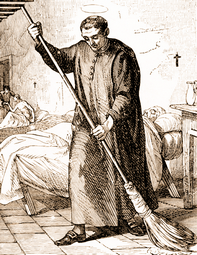Lives of the Saints
Our Models and Protectors
Spiritual Bouquet:
June 4

Saint Francis Caracciolo
Founder
(1563-1608)
Saint Francis was born in the kingdom of Naples in 1563, of the princely family of Caracciolo. In childhood he shunned all amusements, recited the Rosary regularly, and loved to visit the Blessed Sacrament and to distribute his food to the poor. To avoid idleness, however, he engaged in hunting, which pastime was not pleasing to God; and Our Lord, to detach him from the world, sent him a terrible trial. When he was 22 years old, he developed leprosy and soon was on the brink of death. Seeing his body in this deplorable condition taught him contempt for the vanity of the world and of youth's physical strength, and he promised God to serve Him alone if he were cured. The illness disappeared almost at once. He therefore left his parents, sold his portion of the inheritance for the benefit of the poor, and went to study for the priesthood at Naples. He dedicated himself in particular to visiting prisoners and galley-slaves and preparing criminals for death; he spent his leisure hours visiting the Blessed Sacrament in unfrequented churches.
God called him, when only twenty-five, to found the Order of Regular Minor Clerics, with two other priests who had similar aspirations. The Rule they drew up prescribed that each day one of the members fast on bread and water, another take the discipline, a third wear a hair shirt, and each succeed another for perpetual adoration before the Blessed Sacrament. Thus they hoped to appease the anger of God unceasingly, and draw down His blessings by their penance. They took the usual vows, adding a fourth — not to accept dignities unless required to do so by their sovereign.
These very humble priests resolved to arrive in total poverty in Rome to seek approbation for their Order, and they mingled with the poor who were asking for alms at the door of the Capuchin Fathers. When recognized by relatives, they asked no favor except that of being taken to the presence of the Holy Father, Sixtus V. The Pope approved the new Congregation and gave them a church in Naples, which became the first center of the Order.
To establish the new Order, Francis, with John Augustine Adorno, his co-founder, undertook journeys throughout Italy and Spain, on foot and without money, content with the shelter and crusts given out of charity. A saintly pilgrim exiled from England predicted to Francis that he would be the new Order's first General; and a Dominican in Spain, before he had heard them talk of their intentions, received the two of them and gave them food, saying: You are the founders of a new Order which will soon spread, for the glory of God and the salvation of souls, and will be especially flourishing in this kingdom. Asked when that would occur, he replied, Not for three years. In Spain still, Adorno again heard the same prophecy from Saint Louis Bertrand, who insisted on kissing his feet.
The prediction was realized. When Saint Francis returned to Valencia, he found that the twelve religious who had remained there had multiplied in number to the point that the house could no longer contain them. In 1591 he was elected the first General of his Order, while still a prey to the sorrow recently caused by the premature death of Adorno at the age of forty. He redoubled his austerities, and devoted seven hours daily to meditation on the Passion, besides passing most of the night praying before the Blessed Sacrament. He was commonly called the Preacher of Divine Love, and in Spain the Order did indeed flourish.
It was always before the Blessed Sacrament that his ardent devotion was most clearly visible. In the presence of his divine Lord his face emitted brilliant rays of light, and he often bathed the ground with his tears as he prayed, according to his custom, prostrate before the tabernacle, constantly repeating with the royal psalmist, The zeal of Thy house has consumed me! It was at Ancona in Italy, where he had gone to prepare another foundation, that his holy soul, on the eve of Corpus Christi 1608, went to join his Saviour in Heaven. He was forty-four years old when he fell ill with a severe fever. He died exclaiming, Let us go, let us go to heaven! When his body was opened after death, his heart was found seemingly burnt, with these words imprinted around it: Zelus domus tuae comedit me — The zeal of Thy house has consumed me.
Reflection. It is for men, and not for Angels, that our Blessed Lord resides upon the altar. Yet Angels throng our churches to worship Him, while men desert Him. Learn from Saint Francis to avoid such ingratitude, and to spend time as he did, in adoration before the Most Holy Sacrament.
Les Petits Bollandistes: Vies des Saints, by Msgr. Paul Guérin (Bloud et Barral: Paris, 1882), Vol. 6; Little Pictorial Lives of the Saints, a compilation based on Butler's Lives of the Saints, and other sources by John Gilmary Shea (Benziger Brothers: New York, 1894).